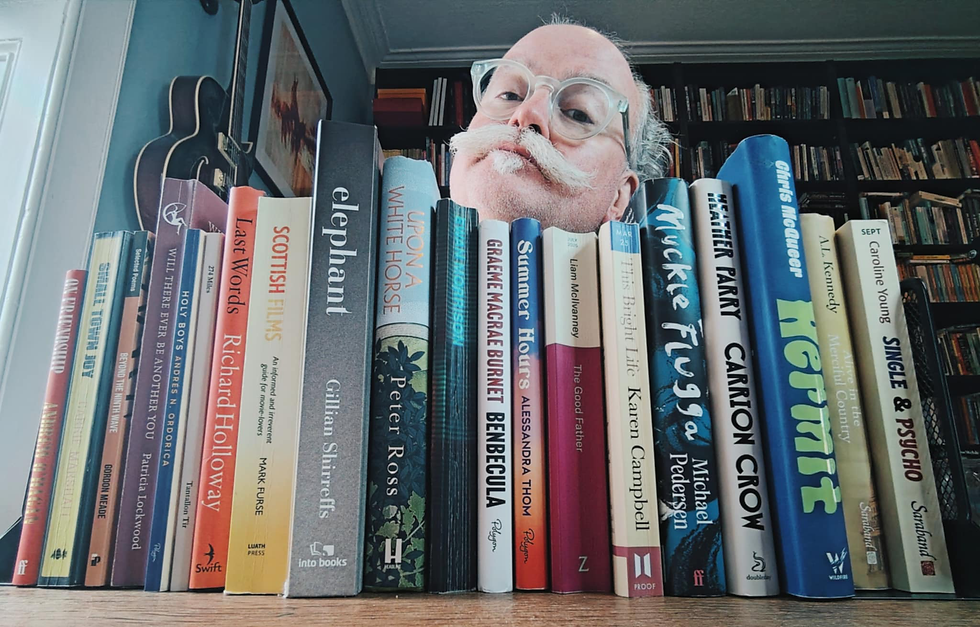Tom Leonard (1944 – 2018)
- Alistair Braidwood

- Dec 21, 2018
- 3 min read

Tom Leonard 1944 – 2018
Back in 1986 I visited Glasgow’s Caledonia Books on Great Western Road and it changed my life. I had recently seen Carl McDougall do a reading at Stirling University and that was the first time I had heard someone who spoke like me and my friends and family reading poetry or involved in literature, and it gave me a thirst for more. In the shop I picked up a copy of James Kelman’s The Busconductor Hines, Iain Banks The Wasp Factory and Tom Leonard’s collection of poetry Intimate Voices. I then spent the rest of the afternoon nursing an underage pint and reading the latter from cover to cover. I would never be the same again.
It’s with great sadness that I write this after hearing about Tom Leonard’s passing. He, alongside his friends and contemporaries James Kelman, Liz Lochhead, Aonghas MacNeacail and Alasdair Gray, would change the landscape of Scottish writing forever, astonishingly all part of the same writing group in Glasgow overseen by Philip Hobsbaum. I love them all, but Leonard’s poetry in particular made a lasting impression. It took the everyday speech of those he lived with, knew and met and made it something magical.
At a time when kids were still being belted, or at least admonished, by parents and teachers alike for not using, what Kelman’s ‘Kieron Smith, boy‘ would call, “the Queen’s English”, Leonard gave his language, and therefore the people who shared it, an agency and advocacy which they had previously been denied, except, arguably, in comedy with Billy Connolly or Hector Nicol. It was alright to be funny, Scottish, and working-class, but hell mend you if you tried to be eloquent as well.
When Leonard’s work is placed alongside Kelman’s, Lochhead’s and Agnes Owens, then it becomes clear that these were writers who gave Glasgow and its surrounding areas a cultural voice which had previously been suppressed, and anyone who tells you that isn’t important is mistaken, but Leonard’s poetry in particular told a story which spoke a universal truth.
In the early part of this decade I was part of a Glasgow University trip where we took American students away for the weekend to Edzell in Angus. While there we did an exercise using Tom’s poem ‘The Six O’Clock News’. One student, who had gone to university on a scholarship, and told us she was from a different socio-economic background to the majority of her fellow students, was almost overcome with emotion. “This”, she said, “is my life – this is my experience. I am judged not by what I say, but how I say it, and this is the first time I have had that so clearly depicted”.
That reaction will always stay with me, as it mirrors my own on that winter’s day back in ’86 – I realised that the power of Tom Leonard’s poetry to make you feel that you mattered, that your voice, and everyone’s voice, is valid, was universal and endured. Tom Leonard mattered, more than he perhaps knew, and his poetry will continue to inspire and fire the imaginations of readers at home and abroad. He will be greatly missed but his work lives on.
This is ‘The Six O’Clock News’:
this is thi six a clock news thi man said n thi reason a talk wia BBC accent iz coz yi widny wahnt mi ti talk aboot thi trooth wia voice lik wanna yoo scruff. if a toktaboot thi trooth lik wanna yoo scruff yi widny thingk it wuz troo. jist wanna yoo scruff tokn. thirza right way ti spell ana right way to tok it. this is me tokn yir right way a spellin. this is ma trooth. yooz doant no thi trooth yirsellz cawz yi canny talk right. this is the six a clock nyooz. belt up.



Comments